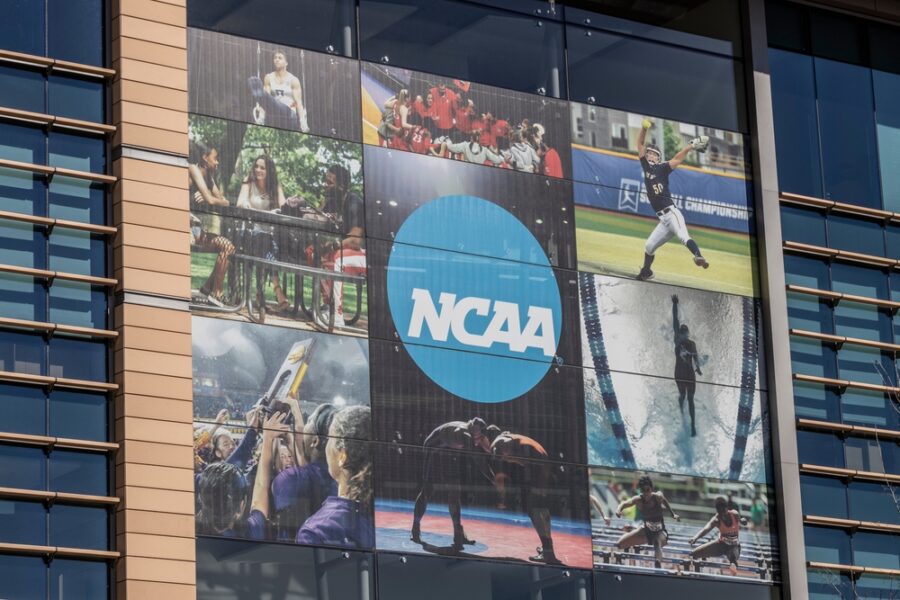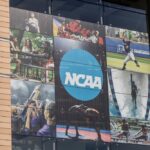Suspected gambling syndicate sparks NCAA basketball investigation

A gambling syndicate is alleged to have been involved in a point shaving scandal, which is being investigated by federal authorities and the NCAA, according to an ESPN report.
Nine sportsbooks in 13 different states and one Canadian province reportedly spotted unusual betting activity on college basketball games played between December 1, 2024, and the middle of January 2025.
Compliance consultancy IC360 found the bets were focused on small-conference teams in at least 11 men’s college basketball games.
The bettors would continuously bet on the same teams to win, with some opening new accounts or returning after inactivity to place unusually large or consecutive wagers on first-half spreads.
Marves Fairley, a Mississippi man who sells betting picks online and describes himself on social media as the “#1 sports betting consultant”, was mentioned by one sportsbook in the report as potentially having links to the syndicate. Fairley has denied any links to the group.
This report comes as part of a wider investigation being undertaken by federal authorities and the NCAA into potential match fixing.
Thirteen former college athletes from Eastern Michigan, Temple, New Orleans, North Carolina A&T, and Mississippi Valley State are currently under investigation, while three athletes from Fresno State have been banned.
Charlotte Capewell brings her passion for storytelling and expertise in writing, researching, and the gambling industry to every article she writes. Her specialties include the US gambling industry, regulator legislation, igaming, and more.
Verticals:
Sectors:
Topics:
Dig Deeper
The Backstory
How a string of red flags escalated into a broader probe
Weeks before federal authorities widened their inquiry into alleged point shaving across men’s college basketball, integrity monitors and sportsbooks were already tracing a trail of unusual wagers. Integrity Compliance 360, a firm that alerts operators and leagues to suspicious activity, twice flagged Eastern Michigan games, including a Dec. 21 matchup against Wright State and Central Michigan’s home game against Eastern Michigan, after large first-half spread bets appeared in clusters. The firm’s alert, later detailed in an ESPN-obtained note and summarized in our coverage of IC360’s warning tied to Central Michigan–Eastern Michigan, spurred conferences, schools and regulators to start asking pointed questions about who was betting, how often and why the action concentrated on small-conference programs.
Those questions only grew louder as sportsbooks in multiple states reported similar patterns on first-half markets. IC360’s alerts did more than tip regulators. They introduced a playbook investigators would see again: new or reactivated accounts, repetitive wagers targeting the same side, and outsized stakes on narrow time slices of games. As the season progressed, the pattern connected dots across jurisdictions and teams, adding urgency to what had been a series of localized reviews.
From scattered alerts to linked investigations
The unusual action around Eastern Michigan did not occur in isolation. A parallel federal inquiry into a suspected professional basketball betting ring surfaced wagers on at least three Division I programs this season. As detailed in our report on the federal probe into a suspected NBA gambling ring, accounts tied to that ring placed sizable prop bets and also bet against Eastern Michigan, Mississippi Valley State and North Carolina A&T. The overlap—same schools, similar bet types and timing—pulled college games into a cross-sport investigation initially centered on NBA prop manipulation.
While the ring inquiry advanced, schools moved on their own conduct reviews. North Carolina A&T suspended three players for violating team rules, though the school did not confirm a gambling link. The connective tissue was nevertheless hard to ignore: first-half markets, small-conference targets and bettors concentrating fire on specific outcomes. These threads, coupled with IC360’s earlier alerts, helped shape the scope of the NCAA’s cooperation with law enforcement and state regulators.
Fresno State becomes a flashpoint
The first major disciplinary outcome came out of the Mountain West. Fresno State was forced into the spotlight as questions shifted from suspicious betting to alleged in-game manipulation. Our early coverage of Fresno State’s internal probe traced the timeline: head coach Vance Walberg alerted administrators, the school opened an inquiry and two players, Mykell Robinson and Jalen Weaver, were accused of placing bets on games in which they played. A third player, Zaon Collins, was withheld from competition amid an eligibility review.
The case swiftly escalated. In a rare and severe enforcement move, the NCAA permanently banned three men’s basketball players—Robinson, Steven Vasquez and Weaver—for betting on their own games and, in some instances, for allegedly coordinating wagers on player props. Our report on the NCAA’s lifetime bans for three Fresno State players detailed how prop-line manipulation and text communications between teammates factored into the decision. The association later underscored that betting on one’s own contests triggers a permanent loss of eligibility, a stance reflected in the NCAA’s official statement on game manipulation and revoked eligibility.
The Fresno State penalties reframed the story from “unusual betting” to a demonstrated case of rule-breaking with competitive integrity at stake. They also served notice to other programs under review that cooperation and transparency would be expected as evidence moved from betting screens to locker rooms and phones.
New Orleans suspensions deepen the bench impact
The alleged manipulation concerns collided with roster realities at New Orleans, where the Privateers suspended four of their top five scorers—James White, Jah Short, Dae Dae Hunter and Jamond Vincent—on Jan. 27 for what school officials termed violations of team rules. The timing, breadth and prominence of the players sidelined magnified the competitive stakes. Our coverage of the New Orleans suspensions tied to suspected gambling violations placed the actions in the context of the season’s integrity narrative and the NCAA’s prohibition against betting by student-athletes and staff.
For mid-major programs, losing multiple starters compresses rotations and strains depth that is already thin compared with power-conference teams. It also raises recruiting and retention questions. If illicit betting probes can sideline key players for stretches or permanently, programs must plan for volatility well beyond injuries or transfers. Administrators are now weighing expanded education, tighter access controls and more robust monitoring partnerships as the enforcement environment hardens.
Why small-conference games and first-half markets drew scrutiny
Integrity monitors and sportsbooks watch for patterns that deviate from historical norms. This season, first-half spreads in small-conference games set off alarms because they can be more lightly traded, making outsized wagers more conspicuous and potentially more influential on the price. As described in the IC360 alert tied to Eastern Michigan, operators observed large, repetitive first-half bets arriving from newly opened or reactivated accounts. That tactic can signal attempts to avoid internal risk thresholds or to split exposure across multiple identities.
Separately, the federal inquiry into a suspected NBA betting ring illuminated another vulnerability: player props. Those markets are particularly sensitive to inside information about minutes, usage or health and have been central to recent high-profile cases, including the NBA matter that bled into the college ranks. The Fresno State case fused both concerns—props and potential underperformance—into a cautionary example of how thin edges can be exploited if oversight falters.
The stakes for regulators, schools and the market
The cascading investigations have forced a real-time stress test of safeguards built since legal sports betting expanded. Regulators depend on rapid alerts and data sharing. Schools need clear reporting channels when coaches or staff suspect misconduct. The NCAA, while reiterating zero tolerance for betting by athletes on their own games, faces pressure to standardize responses across conferences and ensure due process matches the speed of the betting markets.
For sportsbooks, the cost of policing suspicious action is now a core operating expense, not an occasional compliance task. Pulling markets, limiting accounts and escalating reports can protect integrity but also frustrate customers and affect handle. For college athletes, the message has sharpened: wagers that once felt distant now carry immediate career-ending risk. The NCAA’s public revocation of eligibility in the Fresno State case signaled that penalties will be swift when evidence shows bets on one’s own team.
As federal authorities trace whether a coordinated group targeted specific college games and markets, the through line remains clear. Early-season alerts around Eastern Michigan, subsequent flags involving North Carolina A&T and Mississippi Valley State, and the Fresno State punishments reflect a maturing detection ecosystem converging on the same anomalies. The next phase will test whether enforcement and education can get ahead of tactics that migrate quickly from one league, platform or market to another.







